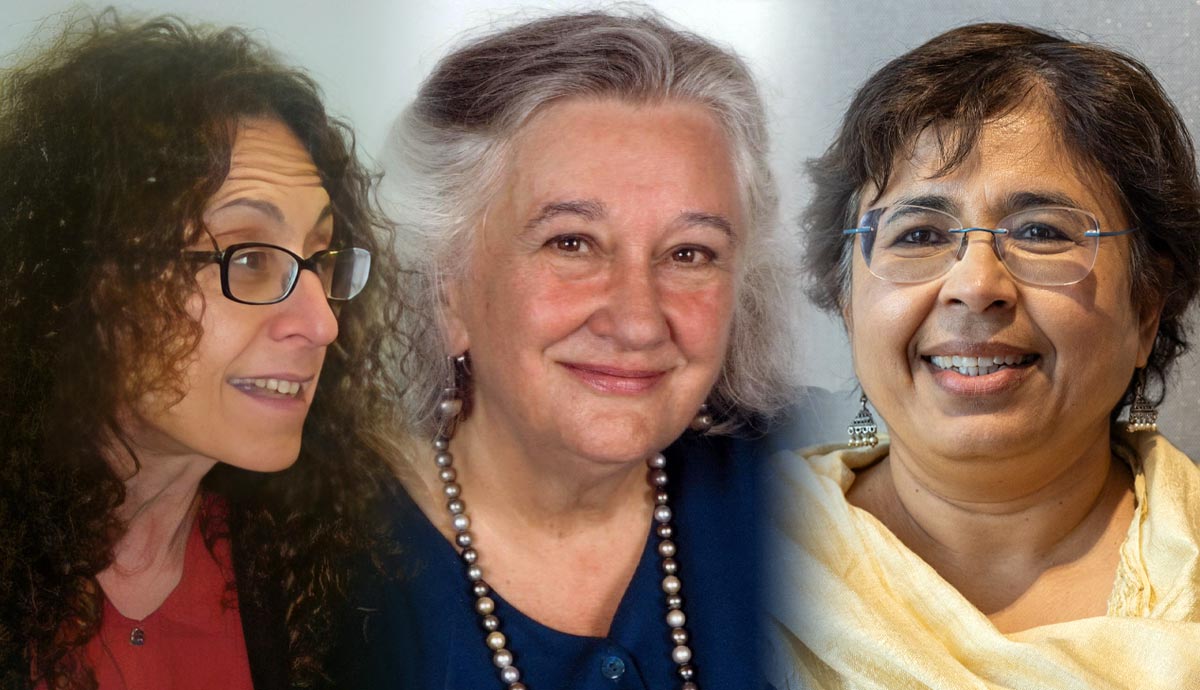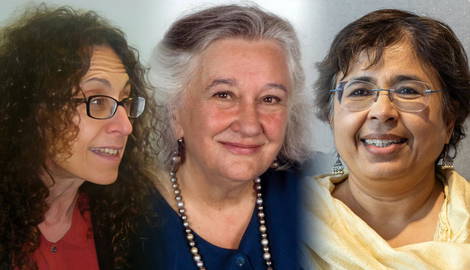
The relationship between mind and body is one of the perennial questions, most often associated with the history of Western philosophy and one of its key figures, René Descartes. Descartes believed that the mind and the body are two radically different substances. However, there are some good arguments against this traditional view. Within these counter arguments are arguments for materialism, physicalism, etc. Many women have taken up the mantle of this question, coming up with incredible theories that span several disciplines in the contemporary, analytic philosophy of mind.
Women in the Philosophy of Mind

“Where is My Mind” is not only a Pixies’ hit song but also one of the philosophical questions plaguing philosophers, theologians, and regular people (like the Pixie’ songwriter). One of the possible answers was a dualist one: the mind is not in space, unlike the body, so these two must be different despite their interaction. Descartes also offered additional arguments: the mind can’t be divided, whereas the body can; we can imagine ourselves disembodied, albeit not without a mind.
The resurgence of mind sciences in the 20th century cast a shadow over dualism through empirical studies. Analytic philosophy of mind in the 20th century was either inspired by science in advancing empirically informed arguments against dualism or tried to disprove it solely on conceptual grounds. In what follows, we survey several women philosophers of mind whose contributions to the field are both constitutive for the field and thought-provoking, although insufficiently emphasized. The common denominator for all of them is that they firmly believe in a much tighter connection between mind and body, broadly construed.
1. Patricia Churchland

We start with the most radical of them all. Patricia Churchland (1943-), along with her husband Paul Churchland, is one of the most famous and widely recognized philosophers. The Churchlands are behind two great ideas in the philosophy of mind: eliminative materialism and neurophilosophy. For them, understanding the mind is impossible without understanding the brain because, ultimately, our mind is the brain.
Patricia Churchland started as a BA at the University of British Columbia, completed her MA at Pittsburgh University, and earned BPhil from Oxford in 1969. She worked at the University of Manitoba before she took a position at the University of California San Diego, where she is currently professor emerita. She also holds an adjunct professorship at the Salk Institute for Biological Sciences from 1989, where she had the opportunity to collaborate with Francis Crick, the father of molecular biology, and Terrence Sejnowski, the godfather of computational biology. She holds two honorary doctorates from the University of Alberta and the University of Virginia, and a MacArthur fellowship (also known as the “Genius Grant”).
The Churchlands devoted their careers to arguing that the mind-body problem will be solved by neuroscientists rather than philosophers of mind. For them, folk psychological concepts like belief, desire, hope, and fear will be eliminated once neuroscientists dissect neural underpinnings of mental states. In other words, the Gordian knot of conceptual issues in the philosophy of mind will be untied empirically.
In her first book, Neurophilosophy (1989), Patricia Churchland advocates for a reductionist view of mind, which means that neurophysiology, neuroanatomy, and neuropsychology provide relevant theoretical apparatus for describing what is inside our heads. However, the best part about her book and subsequent work is that it is truly interdisciplinary: not only does she help philosophers who want to know more about the central nervous system and the methodology of neuroscience, but she also helps neuroscientists struggling with philosophical questions.
2. Ruth Millikan

Ruth Millikan is one of the most original living analytic philosophers. Changing the course of traditional fields like philosophy of language and mind through evolutionary biology is far from trivial, and Millikan keeps doing it repeatedly in each new book she publishes.
Millikan received a BA at Oberlin College in 1995 and a PhD at Yale University in 1969. She had the privilege of being mentored by Wilfrid Sellars for some time. She spent almost all her career at the University of Connecticut, where she is currently professor emerita. Millikan was also a member of the American Academy of Arts and Sciences in 2014 and has received two eminent awards in philosophy – the Nicholas Rescher Prize for Systematic Philosophy and the Rolf Schock Prize for Philosophy and Logic.
Millikan’s mission was to naturalize intentionality. Philosophers assume that our minds are endowed with intentionality, meaning that our thoughts are always about something or have content. Millikan’s main contribution was showing how to think about intentionality in biological or teleological terms in her first book, Language, Thought and Other Biological Categories (1984). In it, she introduced teleosemantics or biosemantics as the novel position in the philosophy of mind and language.
The main point of biosemantics is that some contents of our thoughts were selected through natural selection in the later Pleistocene when our ancestors had to survive in a hostile environment. Thus, the meaning we attribute to the objects of our desires, hopes, or fears lies in their functional role in our organism. This further means that for Millikan, our mental states are fundamentally shaped by evolutionary processes and are dependent on causal relationships between us as biological organisms and environmental conditions.
3. Margaret Boden

The birth of cognitive science, the interdisciplinary field connecting philosophy, linguistics, psychology, artificial intelligence, neuroscience, biology, and anthropology, was witnessed by Margaret Boden (1936-). Boden is not only a creative (wait for the pun) philosopher who introduced computational creativity as a relevant research topic at the intersection of philosophy, cognitive science, and artificial intelligence but also a historiographer of cognitive science.
She earned her PhD at Harvard and ScD at Cambridge, where she attended classes in medicine and philosophy in the 1950s. In 1965, she became a lecturer in philosophy and psychology at the University of Sussex. She has been the founding dean of the University of Sussex’s School of Cognitive and Computing Sciences, from which the Department of Informatics was established. She is currently a research professor of cognitive science at the same university within the Department of Informatics and a fellow of the British Academy. Boden was awarded a medal of the Order of the British Empire for services to cognitive science in 2001. She is also a recipient of the Covey Prize by the International Association for Computing and Philosophy, the Lifetime Achievement Award by the International Society for Artificial Life, and the Allen Newall Reward by the Association for Computing Machinery.
Boden has published 14 books and edited volumes, including the very first edited volume in the philosophy of artificial intelligence in the 1980s. In one of her most influential books, The Creative Mind: Myths and Mechanisms (1990), Boden had set her goal to shun Cartesian superstition surrounding creativity. She used computational models to explore and explain human creativity because she believed these models could help us chart the cognitive mechanisms underlying creative processes.
This is not to say that artificial intelligence can be creative like we are, but rather that it can be used to better understand ourselves. This book has seen new editions in light of the development of artificial intelligence in the 2000s, and Boden’s conclusions are especially relevant in this frightening yet unprecedented time of generative artificial intelligence like DALL-E and Midjourney.
4. Janet Levin

Historically, the fiercest opposition to dualism was materialism, or physicalism, in the 20th-century philosophy of mind. Materialists or physicalists were less radical than the Churchlands but believed that mental states are akin to physical states, broadly construed. Janet Levin is a shieldmaiden of this position – she defends the materialist theory of consciousness, albeit conceptually rather than relying on empirical studies.
Levin received her BA from the University of Chicago in 1972 and her PhD from MIT in 1980. She is currently a professor emerita at the University of Southern California. In 2020, she delivered the Pacific Division Dewey Lecture and served as an executive committee member of the Pacific Division of the American Philosophical Association.
In her recent book, The Metaphysics of the Mind (2022), Levin provides a survey of all influential positions in the analytic philosophy of mind. She debunks all the myths surrounding each position and the traditional isolated Cartesian mind. Levin is most concerned about the status of phenomenal states. These states emerge when we taste apples or hear a song we like. At first glance, this particular aspect of sensation can’t be reduced to its physical description. Levin wants to show that a successful metaphysical theory of mind must explain these states coherently, and she believes that physicalism is up to that task.
5. Keya Maitra

Even though it may seem that philosophy of mind, being a theoretical philosophical field, can’t be linked to real-world issues like bias and discrimination, Keya Maitra showed the opposite. With another socially engaged American philosopher, Jennifer McWeeny, she co-edited a volume Feminist Philosophy of Mind in 2022. This marked the exciting beginning of a new philosophy of mind—that of an auto-reflective, conscientious, and inclusive field.
Holding both a PhD from India and the USA, Maitra currently works at the University of South Carolina Asheville and teaches philosophy and Asian studies. She is a recipient of numerous academic rewards, such as the Board of Governors Award for Excellence in Teaching and the Fulbright-Nehru Academic and Professional Excellence Senior Research Award. The peculiarity of her approach to teaching philosophy is her “quiet sitting” exercise. Upon entering the classroom, all students are tasked with a moment of contemplation to clear their minds and ground themselves in the present.
Maitra argues that we must transcend the confines of our minds, to which Descartes famously bound us, and advocates for the development of externalism about mental content through a feminist lens.
This is because she believes that the current philosophical account of externalism does not reflect complex sociocultural and historical forces that shape our mental lives. Generally, externalism holds that the content or meaning of our mental states (such as beliefs, desires, or thoughts) is not solely determined by factors within our minds but also by factors external to us, such as our environment or our causal interactions with the world. However, Maitra argues in her contribution to the co-authored edited volume that mental content is held stable to a significant degree through the social and political import of concepts emptied from the particular female standpoint.










